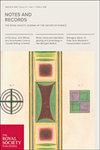Enlarging the bounds of moral philosophy: Why did Isaac Newton conclude the Opticks the way he did?
IF 0.6
3区 哲学
Q3 HISTORY & PHILOSOPHY OF SCIENCE
Notes and Records-The Royal Society Journal of the History of Science
Pub Date : 2017-03-20
DOI:10.1098/rsnr.2016.0011
引用次数: 2
Abstract
This paper draws attention to the remarkable closing words of Isaac Newton's Optice (1706) and subsequent editions of the Opticks (1718, 1721), and tries to suggest why Newton chose to conclude his book with a puzzling allusion to his own unpublished conclusions about the history of religion. Newton suggests in this concluding passage that the bounds of moral philosophy will be enlarged as natural philosophy is ‘perfected’. Asking what Newton might have had in mind, the paper first considers the idea that he was foreshadowing the ‘moral Newtonianism’ developed later in the eighteenth century; then it considers the idea that he was perhaps pointing to developments in natural theology. Finally, the paper suggests that Newton wanted to at least signal the importance of attempting to recover the true original religion, and perhaps was hinting at his intention to publish his own extensive research on the history of the Church.扩大道德哲学的范围:为什么艾萨克·牛顿会这样总结《光学》?
本文提请注意艾萨克·牛顿的《光学》(1706)及其后续版本的《光学》(1718、1721)中引人注目的结束语,并试图说明为什么牛顿选择以他自己未发表的关于宗教史的结论作为结束语。牛顿在结束语中指出,随着自然哲学的“完善”,道德哲学的范围将会扩大。当被问及牛顿可能有什么想法时,论文首先认为他是在为后来在18世纪发展起来的“道德牛顿主义”埋下了阴影;然后考虑到他可能指的是自然神学的发展。最后,这篇论文表明,牛顿想至少表明试图恢复真正的原始宗教的重要性,也许是在暗示他打算发表自己对教会历史的广泛研究。
本文章由计算机程序翻译,如有差异,请以英文原文为准。
求助全文
约1分钟内获得全文
求助全文
来源期刊
CiteScore
1.50
自引率
0.00%
发文量
45
审稿时长
>12 weeks
期刊介绍:
Notes and Records is an international journal which publishes original research in the history of science, technology and medicine.
In addition to publishing peer-reviewed research articles in all areas of the history of science, technology and medicine, Notes and Records welcomes other forms of contribution including: research notes elucidating recent archival discoveries (in the collections of the Royal Society and elsewhere); news of research projects and online and other resources of interest to historians; essay reviews, on material relating primarily to the history of the Royal Society; and recollections or autobiographical accounts written by Fellows and others recording important moments in science from the recent past.

 求助内容:
求助内容: 应助结果提醒方式:
应助结果提醒方式:


